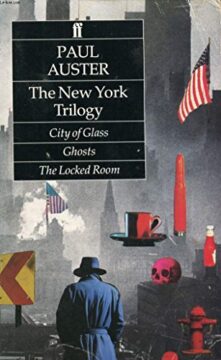Erica Wagner at the New Statesman:
 “It was a wrong number that started it, the telephone ringing three times in the dead of night, and the voice on the other end asking for someone he was not.” So begins City of Glass, the first book in what became Paul Auster’s acclaimed New York Trilogy. Published in 1985, it marked the arrival of a truly unique voice in fiction, one quite distinct from many of the currents in American writing at the time. This was not the minimalism of Raymond Carver, or the expansiveness of Tom Wolfe; this was work much more connected to the traditions of European literature in which Auster was steeped. Paul Auster, who has died at the age of 77 in Brooklyn – where he lived his wife, the writer Siri Hustvedt – leaves a lasting and distinctive legacy in English-language literature.
“It was a wrong number that started it, the telephone ringing three times in the dead of night, and the voice on the other end asking for someone he was not.” So begins City of Glass, the first book in what became Paul Auster’s acclaimed New York Trilogy. Published in 1985, it marked the arrival of a truly unique voice in fiction, one quite distinct from many of the currents in American writing at the time. This was not the minimalism of Raymond Carver, or the expansiveness of Tom Wolfe; this was work much more connected to the traditions of European literature in which Auster was steeped. Paul Auster, who has died at the age of 77 in Brooklyn – where he lived his wife, the writer Siri Hustvedt – leaves a lasting and distinctive legacy in English-language literature.
City of Glass, in which a writer of detective fiction is pulled both into and away from “the real world”, or the world at least as he has perceived it, reads like a mystery, but the real mystery at its heart is one of identity and the role that chance plays in all our lives. These issues would echo throughout Auster’s work, in novels such as Moon Palace (1989), The Music of Chance (1990) and The Book of Illusions (2002).
more here.
